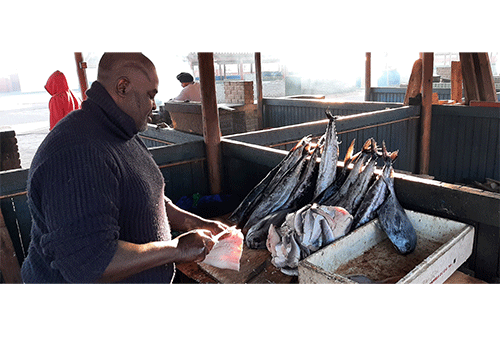The fishing sector is considered the third largest contributor to the country’s GDP; however, this sector’s greater impact is felt more in its spinoffs and the livelihoods it sustains all over the country.
Many do not directly benefit from the sector, but they capitalise on its spinoffs that not only promote the consumption of fish but give thousands access to the variety of the country’s natural resources.
Due to this, they create additional employment for the sector and support hundreds of families through their income-generating efforts.
Hundreds of women are seen everyday, carrying boxes of fish that would be a meal for locals, who will be grabbing a bite around the street corners, instead of taking a taxi home to eat.
These women are seen everyday at the street corners with their freshly baked fish, vetkoek and tradition drinks to feed others so they can, in return, make money for their families.
According to Helena Shikalepo (48), she wakes up around 04h00 every morning to prepare her fish so that it is ready for the market by 08h00.
“Every evening when I return home, I make sure that I take out a batch of fish that needs to defrost over night. This makes it easier for me to prepare it the next morning and make sure it’s ready when my taxi picks me up,” she explains.
Shikalepo is one of the familiar faces that sells everyday, except from Sunday, in front of the fishing factories.
She added her clients mainly prefer freshly prepared crispy fried horse mackerel and deep-fried hake.
“This is my bread and butter, so I take my business seriously, as it puts food on the table,” she says.
According to Shikalepho, she can make about N$600 on a good day, especially when she pairs her fish with fresh vetkoek.
“I never thought I would do this but I could not sit around and wait for job opportunities. Thanks to this, I am helping my four children get through school, and supporting my family financially,” she said.
Also, selling fish in the industrial area, Elizabeth Nakale says she prefers to sell fish at street corners, as she makes more money than when she is employed in a fishing factory.
“The money is good; you just need to be result-driven and have patience. The weather conditions is also not for the faint-hearted,” she adds.
Nakale explained she sets a target monthly, and that has been motivating her to get up everyday to sell her fish.
Another vendor, Nangula Sepati says it is all about scouting for correct suppliers, comparing prices and negotiating for transport to maximise on profit.
She currently sells fish in Windhoek, saying she saw the opportunity to venture in fish trading after observing the need and demand for fish among friends and family.
“I started by informing them in advance when I travel to Walvis Bay so that they could place orders. I would then scout for factories or suppliers having sales to buy my stock. That is how I build my own client base in Windhoek,” she said.
According to Nakale, her business grew to an extent she bought freezers for the stock.
“Now, I make about N$5 000 from my side business. I love doing it, as it gives me financial freedom as well,” Nakale said.
However, all of them agree that one does not need a fishing quota to reap this natural resource, as there are many ways to benefit from the fishing sector without being employed or having a quota.
Currently, the fishing sector is said to have employed over 16 000 direct people, while several other jobs are created indirectly.


